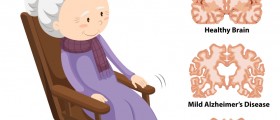
Alzheimer’s (Alzheimer) disease, AD or senile dementia of the Alzheimer type is the disease which affects the brain usually in people over 65 years of age. However, early-onset Alzheimer disease may develop in much younger adults. This disease is diagnosed in over 26 millions of people all over the world and, according to estimation, by the 2050 this disease will affect 1 out of every 85 people. Life expectancy after the diagnosis is about 7 years, while less than 3% of all patients live more than 14 years.
Modern medicine doesn’t know exact cause of nor does it have any cure for Alzheimer disease. So far, all that doctors can offer to patients and families of people diagnosed with Alzheimer are medications which may slow down further progression of the disease, improve the quality of life and delay placement in the nursing home. These drugs don’t work for all AD patients or the effects might be temporary or very mild.
There are two types of medications approved by the FDA (Food and Drug Administration) to be used for Alzheimer’s disease, usually differentiated according to the stages of the disease they are used in. Cholinesterase inhibitors are given in earlier stages of the AD, while later stages of this disease usually require additional treatment with memantine.
Cholinesterase Inhibitors in Alzheimer Disease
These drugs work by improving the efficacy of acetylcholine in the brain, by enhancing the response of the nerves to this substance or increasing its amount, which has positive results on the AD patients. Cholinesterase inhibitors can’t reverse or stop the development of Alzheimer’s disease and they are used in patients diagnosed with mild to middle stages of this disease. All of the drugs have similar effects, but some people may have fewer side effects of experience better results with certain drugs. After some time, these medications are not able to be efficient anymore and they are usually combined with another drug (memantine).
Commonly used cholinesterase inhibitors are: rivastigmine, donepezil and galantamine. Rivastigmine (Exelon) dose is usually started low and then increased and adjusted to the patients, to avoid gastrointestinal problems. Donepezil (Aricept) is less likely to cause any severe adverse effects and can be used in all stages of Alzheimer disease. Galantamine (Razadyne) is usually taken once or twice per day. Known side effects include gastrointestinal problems and potential lethal consequences due to stroke or heart attack.
Drugs for Later Stages of Alzheimer Disease
Memantine (Namenda) is used in patients suffering from moderate to severe AD, with one known adverse effect - dizziness. Most patients in this stage of the disease are advised to combine cholinesterase inhibitor and memantine, for better results.

















Your thoughts on this
Loading...